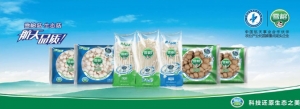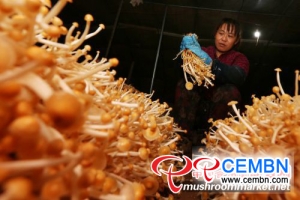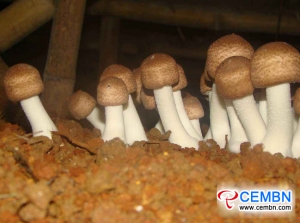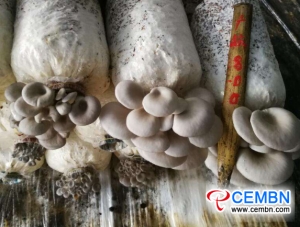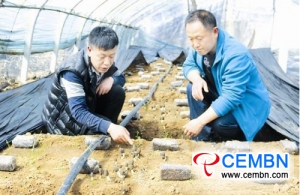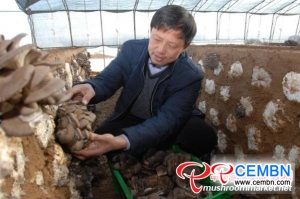
Mushroom Matter
Welcome on our platform. Why MUSHROOM MATTER? Because mushrooms play an important role in our lives as well in business. Our goal is to bring the world the very latest mushroom news with the upmost care to support the positioning of our beloved Mushroom.
China’s leading industrialized mushroom enterprise: Shanghai Xuerong Biotechnology Co., LTD
Shanghai Xuerong Biotechnology Co., LTD mainly engages in R&D, industrialized cultivation and marketing of fresh mushrooms, main products include Enoki, Shiitake, Hypsizygus marmoreus and others.
As the incontrovertible leading mushroom enterprise in China, daily output on Enoki, Hypsizygus marmoreus and Shiitake respectively comes to 304 tons, 26 tons and 130 tons in the company, gross daily mushroom production attains 460 tons, which ranks first among Chinese industrialized mushroom enterprises and is twice times of the second place.
To see from external environment, mushroom requirement is rapidly increasing, proportion of industrialized mushroom production is increasingly expanded while concentration degree of the industry is low. And on its own terms, Xuerong Company completely specializes in industrialized production of fresh mushroom, it is the incontrovertible leading enterprise and it holds several overwhelming superiority in aspect of output capacity, channel, technology and brand.
Mushrooms carry abundant nutrition, agree with modern consumption upgrading and indicate broad development prospect. Industrialized mushroom production has become the inevitable trend in mushroom industry, it is also the recognized only route for mushroom industry to go from large to strong.
As the characteristic pillar industry, mushroom industry has become the crucial path for poor households to grow well-off in Lingbao City, Henan Province of China.
Since 2017, scale of mushroom industry has been experiencing a steady rise while economic benefits have been evidently lifted in Lingbao City. Up to now, gross cultivation capacity obtains 128 million bags, of which Shiitake occupies 97.567 million bags. Besides, gross output on fresh mushroom comes to 11.23 tons, gross incomes achieve 1.397 billion CNY, which accounts for 93.13% of the year’s quota. By the end of this year, gross income on mushroom industry is expected to attain over 1.5 billion CNY in Lingbao City.
Mushroom industry is full of vitality
At present, in modern agricultural demonstration garden of Huaibei City, Anhui Province of China, workers are busy with mushroom picking with happy thought.
With the development mode of “Cooperative+Base+Farmer,” the garden implements order-oriented cultivation and vigorously leads local farmers to end poverty and grow affluent. Now, it covers over 10,000 square meters, holds 20 greenhouses which mainly engage in production of Oyster, Enoki, Straw mushroom and others, output value comes to 6 million CNY.
Brazil mushroom indicates a flourishing tomorrow
Now, Brazil mushroom industry is leading bright prospect in Yonghe Village, Wuchuan County, Guizhou Province of China.
With 2 million CNY of investment, Yonghe Village transformed 20 mu of land on development of Brazil mushroom industry. By now, 60 greenhouses have been built in the village, 16 of them have been put into production since June, and above 34,200 kg of Brazil mushroom have been produced, which helps generates gross bonus of 46,000 CNY for local 92 poor households.
Brazil mushroom industry has been hailed as the stable channel for local masses to generate incomes in Yonghe Village. Next step, the village is going to expand cultivation scale, and strive to bind more and more poor households on the industrial chain, realize stable development of village’s collective economy and boom the masses.
1. Sowing volume of substrate on mushroom sack and fungus bed should always be the same.
2. During the spawn-running period, temperature should be kept consistent so as to guarantee consistent speed of spawn running.
3. Conduct lucifugal cultivation during spawn-running period, and after that, cultivators could moderately stimulate fungus sacks under low temperature when condition permits.
Fertile soil breeds golden Morels
This year, trial Morel cultivation carried out by Mr. Huo, one of villagers of Qiaowa Village, Sanmenxia City, Henan Province of China achieved its success. In meantime of operating bases, he also helps surrounding villages develop 30 Morel greenhouses and provides technical guidance.
By now, acquisition price of Morel has gone up to 160 CNY per kg, in accordance with the growth tendency, 100 kg of Morel could be produced in low-output greenhouse while high-output greenhouse yields 250kg or so, and average pure income on each greenhouse attains 15,000 CNY, which indicates considerable benefits.
In Sanmenxia City, advantaged climate and soil fit for Morel cultivation which is implemented in land parcels or around houses. Sowing work of Morel is usually done in November and picking work is usually launched from next March to April, more and more farmers are growing prosperous via the industry.
Oyster mushrooms are evolving into picking period
For recent days, in mushroom base of Mazhuang Village, Rushanzhai Town, Shandong Province of China, Oyster mushrooms are vigorously popping heads out of sticks.
At the beginning of this year, Mazhuang Village took the lead on Oyster mushroom cultivation in a bid to lift comprehensive agricultural benefit and help the masses to end poverty and increase incomes.
“The mushroom project holds 412,000 CNY of gross investment, at first, hillside field that covers 12 mu of land was transformed on establishment of mushroom greenhouse. By the end of this year, the expected annual revenues come to 20,000 CNY,” said village director of Mazhuang Village passionately.














